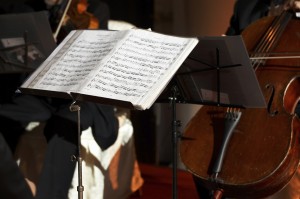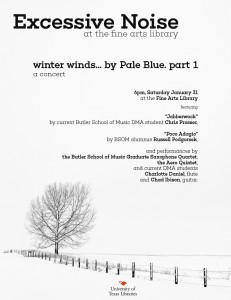 It’s a challenge to combat long-held stereotypes — especially those that have gained a foothold in cultural consciousness — but libraries are increasingly finding ways to overcome an accepted caricature as spaces where quiet contemplation is guarded by strict disciplinarians with fingers firmly pressed to pursed lips.
It’s a challenge to combat long-held stereotypes — especially those that have gained a foothold in cultural consciousness — but libraries are increasingly finding ways to overcome an accepted caricature as spaces where quiet contemplation is guarded by strict disciplinarians with fingers firmly pressed to pursed lips.
More and more, programs developed to redouble the idea of library as a community third place have cut through the silence and opened the space to utilization in unexpected ways. As gateways to information, libraries have always served as cultural hubs; the advent of the internet offers opportunities to reimagine how they can fit within a social framework where the written word has largely ceded prominence to ones and zeroes.
One such example of rethinking space is evident at the Fine Arts Library (FAL), thanks to its close ties with emerging artists at the Butler School of Music.
In 2011, Music Librarian David Hunter approached graduate research assistant and doctoral candidate Russell Podgorsek — also the evening and weekend desk manager for the library at the time — about launching a music series to take place in the Roberts Reading Room at the FAL.
Podgorsek ran with the idea, imagining an eclectic program that had its roots in classical techniques, but would be creatively free-form in substance. He began pitching the concept to his colleagues and contemporaries in the university and broader Austin music communities and recruiting artists for the series premiere that took place in early 2012 and featured three original compositions by students of the Butler School — including Podgorsek, who is himself an accomplished composer, violist and guitarist.
To date, concerts have featured an array of composers, artists and performers from both the School of Music and the Austin community, including the Cordova Quartet; university Middle Eastern Music Ensemble, Bereket; Duo Brucoco; alumna Pamela Wilkinson; and dancer Reema Bounajem.
“Excessive Noise” will resume its run with the seventh concert in the series on January 31, and Podgorsek continues his curatorial duties under the appellation of the recently-formed Pale Blue. collaborative.
The concert, “winter winds… by Pale Blue. part 1,” features chamber music for winds including “Jabberwock” by current Butler School of Music (BSOM) DMA student Chris Prosser; “Poco Adagio” by BSOM alumnus Russell Podgorsek; and performances by the Butler School of Music Graduate Saxophone Quartet, the Aero Quintet, and current DMA students Charlotte Daniel (flute) and Chad Ibison (guitar).

Podgorsek took time recently to answer some questions about his experiences in developing “Excessive Noise.”
What spawned the idea for “Excessive Noise”?
Russell Podgorsek: Back in 2011 Dr. David Hunter asked me if I’d be interested in resurrecting a music series at the Fine Arts Library since one had been done years earlier but not in recent memory.
At the time “Excessive Noise” started I was a Graduate Research Assistant at the Fine Arts Library. (Fine Arts Head Librarian) Laura Schwartz, (Theater and Dance Librarian) Beth Kerr and David Hunter were kind enough to fold it into my responsibilities along with supervising and stacks maintenance. Once I graduated I stayed on as an hourly employee so it was easy to continue the series.
How do you come up with the programs?
RP: The programs are largely centered around players’ availability and interest in performing what they’re working on. Being a composer myself it also seemed natural to have several new works on each concert. UT and Austin in general are musically so rich that it’s almost too easy to fill up a program sometimes. Recently I’ve asked others at UT to collaborate with us in an effort to engage other libraries and collections as well as other departments. Last spring we did a joint event with the PCL Map Collection’s event series, “You Are Here,” that showcased works with ties to specific locales and the corresponding items in the Map Collection and at FAL. Later this semester we’re joining up with the Asian Studies department to present a concert exploring the intersection of Eastern and Western cultures. On smaller scales, we’ve had students from both Architecture and Theater and Dance perform or present on these concerts as well.
What sort of benefit does it provide for the performers/artists?
RP: Performing itself is an enjoyable activity but the audiences that these events draw are of a different composition than those at a “regular” recital or concert and connecting with a new part of the community is what it’s about. That being said, all of the performers are young professionals (the Butler School of Music is a great place), they know what they’re doing, and always present a high quality artistic product.
Laura Schwartz is really open to programs like “Excessive Noise” that make use of library space in an unexpected way. What’s it like holding the event in a library?
RP: The Fine Arts Library is a fantastic venue. It’s got a great acoustic, the huge windows with the stadium backdrop and view of the tower is beautiful day or night, and the layout of the reference area and the computer lab make a welcoming environment for relaxed but attentive audiences. Laura, the rest of the staff at FAL, and the team from University Libraries who help us make the events happen are so easy to work with. They really care about contributing to the educational and cultural community and let us utilize what they have in helping achieve those goals.
Talk a little about Pale Blue. What’s the name mean, and what is its relationship to the Austin music community?
 RP: Pale Blue. (pronounced “Pale Blue” or “Pale Blue Dot”) is the name Hermes Camacho (another UT alum) and I have given to the various efforts we’ve made around Austin with respect to new music over the last four or five years. The name comes from the famous Voyager 1 photograph of Earth from deep space. Carl Sagan used that image to make a point about perspective and for us the idea that new music is a living part of a larger cultural system that itself is tied into other systems informs how we choose to program and what kinds of audiences we want to speak to. The biggest reason to name ourselves was to unify the things we’ve done under one immediately recognizable umbrella of artistic integrity and logistical efficiency. I mention those two things (artistry and logistics) because it’s not enough to have flashy PR materials and excellent playing – how you treat your colleagues and your patrons matters just as much, if not more, since they may forget this or that piece of music or presentation, but they’ll hold on to their larger impression of the event. I suppose that’s our version of the shot from Voyager.
RP: Pale Blue. (pronounced “Pale Blue” or “Pale Blue Dot”) is the name Hermes Camacho (another UT alum) and I have given to the various efforts we’ve made around Austin with respect to new music over the last four or five years. The name comes from the famous Voyager 1 photograph of Earth from deep space. Carl Sagan used that image to make a point about perspective and for us the idea that new music is a living part of a larger cultural system that itself is tied into other systems informs how we choose to program and what kinds of audiences we want to speak to. The biggest reason to name ourselves was to unify the things we’ve done under one immediately recognizable umbrella of artistic integrity and logistical efficiency. I mention those two things (artistry and logistics) because it’s not enough to have flashy PR materials and excellent playing – how you treat your colleagues and your patrons matters just as much, if not more, since they may forget this or that piece of music or presentation, but they’ll hold on to their larger impression of the event. I suppose that’s our version of the shot from Voyager.
What’s your relationship with FAL since you graduated?
RP: Now that I hold a position at the Butler School of Music ”Excessive Noise” isn’t an official task but there’s great value in having a consistent event series with consistent leadership (especially when the Libraries are so generous with their support) with respect to the players and the patrons. I look at “Excessive Noise” as a real opportunity for players and composers (whether students, alums, or community members) to reach out to a slightly different audience in a great venue, and that I get to continue holding the reins is a privilege.
Considering how integral you are to the series, what compels you to invest your time in sustaining it, and what do you think the future holds for “Excessive Noise?”
RP: Putting on good concerts is fun in and of itself, though it demands some work. I like interacting with people and have forged a lot of relationships thanks to the series so it’s work with definite benefit. It’s also another way for me to exercise my creative impulse (and it doesn’t hurt that I program one of my own pieces on most concerts!). The word “impresario” keeps coming up when people talk to me about the series. I can live with that label. As for the future, we’ve got a collaboration with Asian Studies in March that should be really exciting, and under the aegis of Pale Blue. we’re hoping to expand the winter concerts into some kind of festival. Also, I’ve always liked exploring the intersection of sports/exercise science and music (I’ve dreamed of having a piece played where the tempo is dictated by the heart-rate of someone on a treadmill or bike trainer) and gastronomy and music (pieces written to the specs of a recipe perhaps?), so we’ve got some collaborations for me to work on for next season already.
“Excessive Noise: winter winds… by Pale Blue. part 1″ featuring music for winds with Chris Prosser, Russell Podgorsek, and performances by the Butler School of Music Graduate Saxophone Quartet, the Aero Quintet, and current DMA students Charlotte Daniel (flute) and Chad Ibison (guitar), takes place at 6 p.m., Saturday, January 31, in the Fine Arts Library (DFA 3.200).
